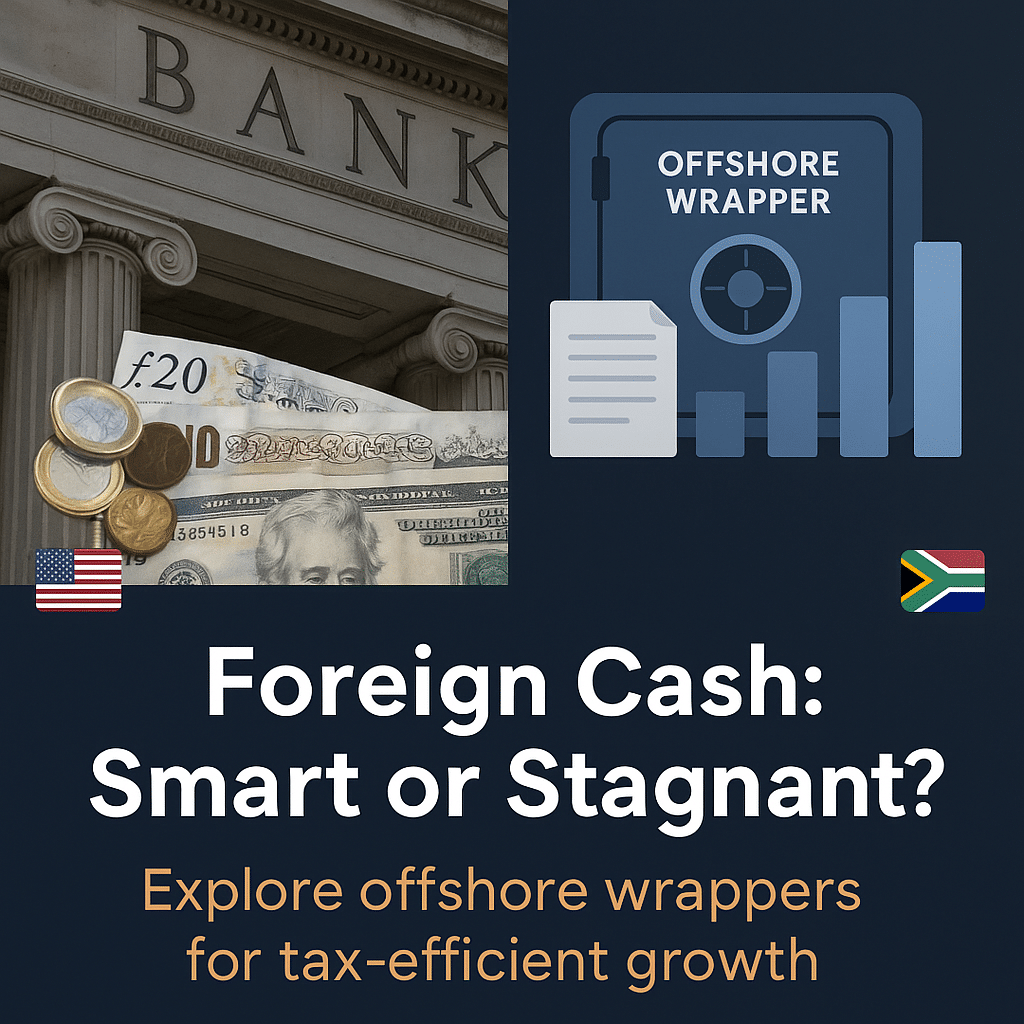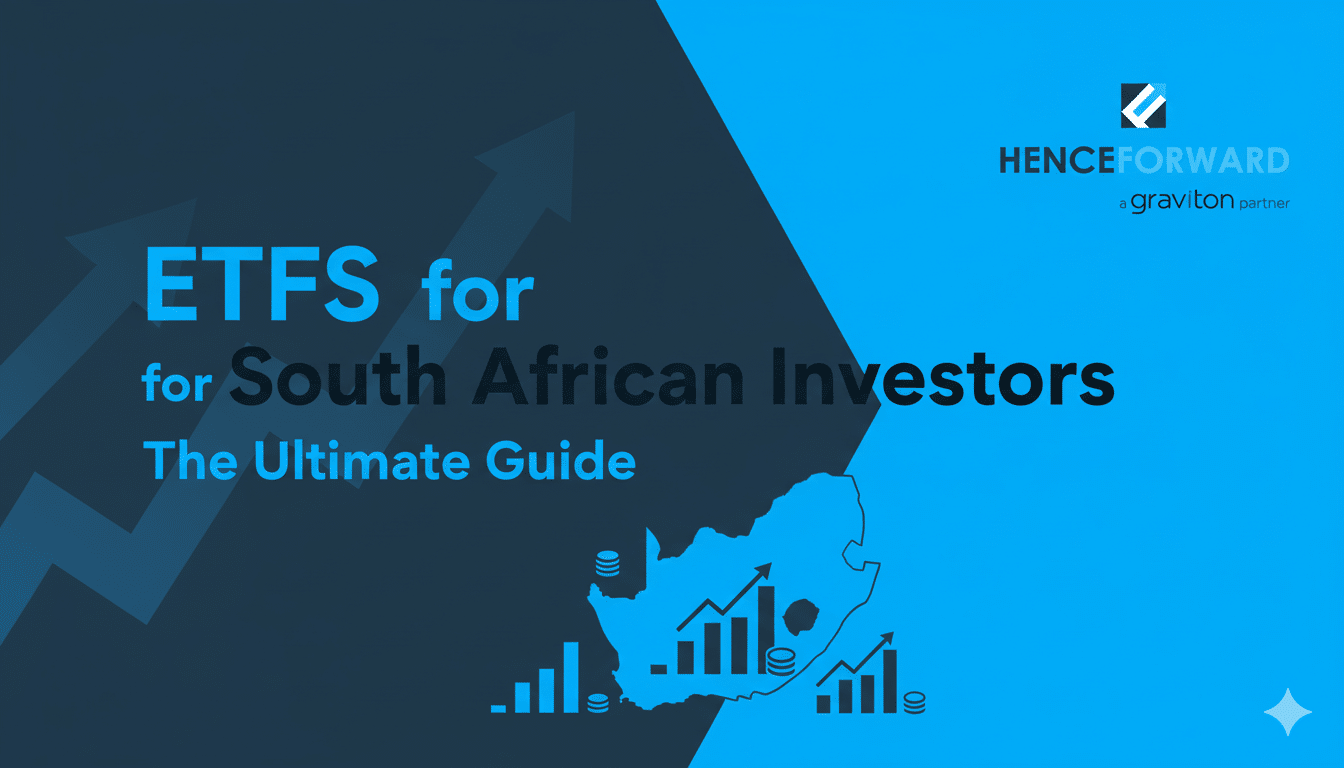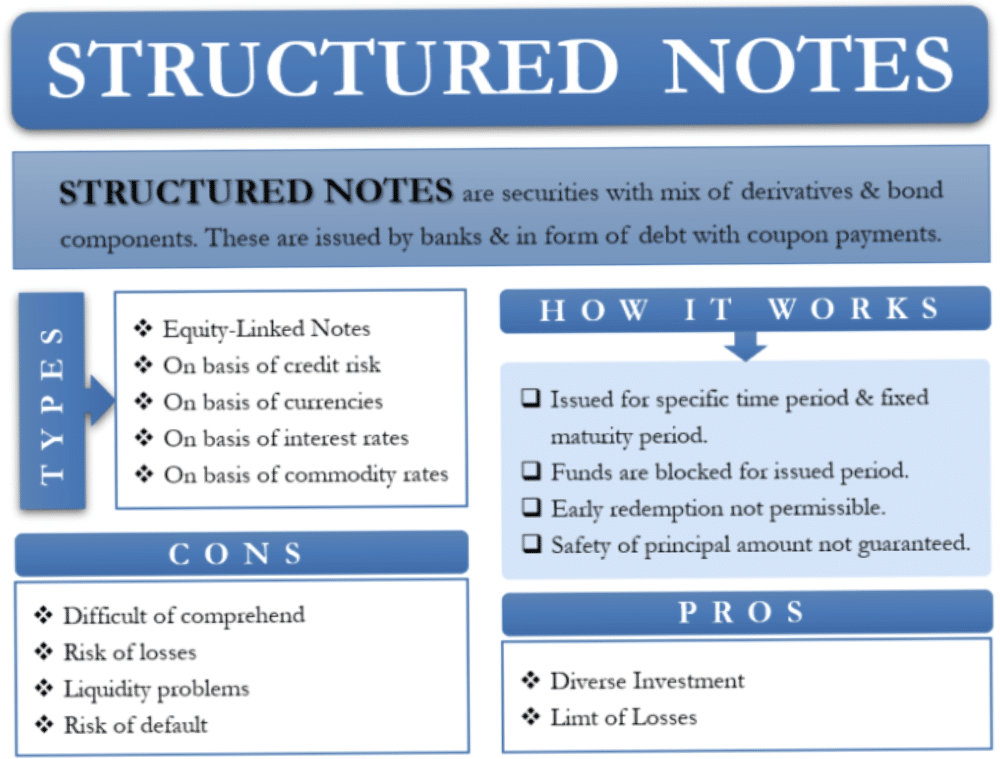Last Updated on 15/08/2025 by Carl-Peter Lehmann
Why Some South Africans Are Sitting on Foreign Cash
For many South African investors, the journey to offshore diversification begins with prudence – convert rands to pounds or dollars and park the money safely in a UK or US bank account (or oftentimes from having worked and lived abroad). It’s understandable. Cash feels secure. It preserves foreign currency exposure and is easy to access.
But is it efficient?
With interest rates high in the UK and the US, it might seem like you’re making a good return. However, many South Africans are unaware of the tax consequences and opportunity costs involved in leaving large sums in foreign bank accounts.
If you’re a South African with more than £100,000 or $100,000 in a UK or US bank account, you may be overpaying tax, exposing your heirs to estate risks, and missing out on tax-efficient growth. Offshore wrappers can offer a smarter, more structured alternative.

What Interest Rates Are You Earning?
As of now:
- UK easy-access and notice savings accounts offer 4.0% to 5.0% AER
- US high-yield savings accounts offer 4.5% to 5.25% APY
That might sound attractive – especially compared to South African bank rates in rand. But there’s a catch: South African residents are taxed on global income, including foreign interest.
Example 1 (GBP): A South African tax resident with £250,000 in a UK account earning 5% receives £12,500 in interest. At a 45% marginal tax rate, that’s £5,625 (or over R135,000) owed to SARS each year.
Example 2 (USD): A South African tax resident with $250,000 in a US account earning 5.25% receives $13,125 in interest. At a 45% marginal rate, that’s $5,906 (or over R110,000) in annual tax liability.
The actual after-tax return is closer to 2.75–2.9%—and that’s before inflation or currency risk.
The Bigger Picture: South Africans Are Holding More Foreign Cash
Recent data highlights a growing trend:
- Standard Bank reported a 121% increase in offshore bank account openings by South Africans between June 2023 and June 2024
- SARS receives automatic disclosures of offshore accounts via global treaties – foreign interest must be declared in SA
- The top 1% of South Africans hold over 50% of total wealth, and this cohort leads in offshore exposure
From Cash to Structure: Why an Offshore Wrapper Could Be Smarter
If your goal is to preserve foreign currency exposure over the long term, then simply sitting in a bank account may not be the optimal strategy. While bank deposits offer stability, they lack tax efficiency, estate planning tools, and investment flexibility.
This is where an offshore wrapper can offer a more holistic solution – allowing you to remain in cash if needed while gaining control, structure, and potential tax advantages.
How Is Interest Taxed Inside an Offshore Wrapper?
Inside an offshore wrapper (such as an offshore endowment policy), the taxation is handled differently from direct investments. These structures fall under Section 29A of the South African Income Tax Act, which applies a “four-fund” tax basis to the underlying assets. For individuals, here’s how it works:
Income Type | Tax Treatment in Wrapper |
Interest & Rental | Taxed at a flat 30% |
SA Dividends | Exempt |
Foreign Dividends | Taxed at a flat 20% |
Capital Gains | Effective rate = 12% (40% inclusion × 30%) |
The insurer pays these taxes within the wrapper, and you don’t need to declare interest, dividends, or gains annually to SARS. Tax is only considered on withdrawal for capital gains, simplifying compliance and deferring liability.
Comparison with Direct Holding:
Taxpayer | Direct Investment | Offshore Wrapper |
Interest Tax Rate | Up to 45% | Flat 30% (in wrapper) |
Tax Reporting | Annual SARS declaration | Paid internally by insurer |
Capital Gains Tax | Up to 18% effective | Flat 12% effective |
Admin Burden | High | Minimal |
This tax treatment makes wrappers especially attractive for South Africans with high marginal rates looking to preserve and grow wealth offshore.
Beyond Tax: Liquidity, Access & Optionality
A common concern is liquidity. While wrappers are insurance-linked products, they are designed to accommodate withdrawals:
- Most providers create multiple internal contracts within the wrapper to offer flexibility
- Withdrawals are typically allowed at any time, subject to terms
- Funds can be paid directly to your offshore bank account, allowing you to keep the money abroad or bring it back to South Africa
Importantly, if you prefer to stay in cash, you can do so inside the wrapper. However, wrappers also allow you to transition into other investment strategies without triggering a new tax event:
- Stay in GBP or USD-denominated money market or short-duration funds
- Gradually allocate to multi-asset or equity strategies
- Invest in ETFs, mutual funds, or structured notes—all within the same tax-deferred structure
Cost Considerations: Are Wrappers More Expensive?
It’s true that wrappers typically carry platform and advisory fees. However, the total cost must be weighed against the potential tax savings, estate planning advantages, and administrative simplicity.
Expense Type | Bank Account | Offshore Wrapper |
Platform Fees | Low/None | ~ from 0.4 % p.a. (add or investment management and advice) |
Interest Tax | Up to 45% (marginal rate) | Flat 30% |
Admin/Compliance | Self-managed, annual SARS | Insurer-managed, low admin |
Probate/Executor Fees | Up to 3.5% + VAT on full estate | Often avoided |
For clients with balances above £100,000 or $100,000, the wrapper becomes cost-effective when tax and estate savings are factored in.
Estate Planning: Cash in a Bank Account Isn’t Always Simple
Cash in a UK or US bank account may seem low-maintenance, but it can create significant estate planning complications if held directly:
- These assets are subject to probate in the foreign jurisdiction
- Your heirs may need to engage a solicitor or attorney abroad to access the funds
- The bank may freeze the account until probate is granted, delaying access
- In South Africa, executor fees of up to 3.5% + VAT can apply to the full value of foreign assets
Example: £250,000 in a UK account = R5.8 million. Executor fees = R203,000 (approx.) even before any UK probate costs.
Probate processes in the UK or US can take 6–18 months, during which time your heirs may have no access to the funds.
Wrappers allow you to name beneficiaries, avoid probate, and bypass foreign legal hurdles entirely … streamlining succession and ensuring faster access to liquidity.
Foreign Bank Headaches: A Hidden Risk for SA Investors
Many South African clients assume that once their cash is in a UK or US bank account, it’s secure and accessible. However, that’s not always the case – particularly in the United States.
Due to FATCA regulations and increased global financial scrutiny, South Africans have encountered serious issues:
- Banks may refuse to service foreign residents, especially those from grey-listed countries
- Some clients have had their accounts frozen or faced account closures
- In one real-world case, a US bank advised a South African client that they could only close the account and send a cheque – which could not be deposited locally, since South Africa no longer processes foreign cheques
- The client had to fly to the US to resolve the issue, incurring stress, delays, and unnecessary costs
These risks are largely avoided when investing via an offshore wrapper linked to a South African-licensed provider.
When Does It Make Sense?
While wrappers have an annual platform and advisory fee, their benefits generally start to outweigh costs from around £100,000 or $100,000. If you:
- Pay the highest marginal tax rate in South Africa
- Want to preserve capital offshore
- May eventually invest in markets beyond cash
- Want fewer admin headaches
- Want to avoid foreign probate
… then a wrapper becomes not just viable, but often superior.
Frequently Asked Questions
-
1. Can I keep my money in cash within an offshore wrapper?
Yes. You can remain in USD or GBP-denominated money market or short-duration funds inside the wrapper. This provides stability while still enjoying tax and estate planning benefits.
-
2. Are offshore wrappers liquid?
Most wrappers are structured with multiple internal policies to allow partial withdrawals. Liquidity is generally available within a few business days, and funds can be paid into your offshore bank account.
-
3. What if I need the funds in the short term?
While wrappers are best suited for medium- to long-term investments, they can accommodate early withdrawals if necessary ... though timing and provider terms apply.
-
4. Are there extra costs compared to a bank account?
Yes, wrappers have annual platform and advice fees. However, these are typically offset by tax savings, estate planning benefits, and long-term flexibility. Above £100,000/$100,000, they’re often more efficient overall. Many product providers offer family based pricing across all invetments. So worthwhile having a chat.
-
5. What happens if I pass away?
Unlike bank accounts, wrappers allow you to nominate beneficiaries. This helps avoid foreign probate and ensures faster, more efficient estate administration.
-
6. Can I access my funds outside South Africa?
Yes. Funds from wrappers can be paid into any offshore bank accounts, giving you global flexibility

Steven Hall
Steven is a Director and founding partner at Henceforward and a CFP® professional with over two decades in financial planning. He specialises in holistic, goals-based advice—integrating offshore cash (often in USD/GBP), currency exposure, liquidity ladders, and tax-aware solutions - so clients maintain access to funds while reducing cash drag and advancing long-term outcomes.





